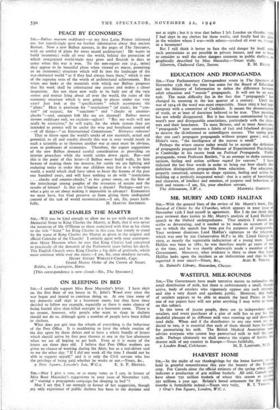EDUCATION AND PROPAGANDA
SIR,—Your Parliamentary Correspondent wrote in The Spectator of November r5th that the time has come for the Board of Education and the Ministry of Information to define the difference between adult education and "morale" propaganda. It will not be an easy task. The main difficulty lies in the fact that "propaganda" has changed its meaning in the last quarter of a century. Until the war of 1914-18 the word was most respectable. Since 1622 it had kept company with a committee of Cardinals. It meant the dissemination of truth, or at least of doctrines believed to be true. That meaning has not wholly disappeared. But it has become contaminated by the word's new and disreputable associations, particularly with the dicta- tors and their henchmen. To most Britons, and to most Americans, " propaganda " now connotes a fabric of fact and falsehood designed to deceive the ill-informed or unintelligent masses. The saying goes that you can't propagate propaganda without proper geese ; and, in Hitler's view, "the intelligence of the masses is small."
Perhaps the wisest course today would be to accept the definition of propaganda prepared by the Professor of Experimental Psychology at Cambridge in his recent book on Political Propaganda. Public propaganda, wrote Professor Bartlett, "is an attempt to shake common opinion, feeling and action without regard for reasons." I have italicised the last four words in order to bring out how clearly this definition distinguishes propaganda from education. For education, properly conceived, attempts to shape opinion, feeling and action by building up a perfectly integrated mind: that is a unity of knowledge and character, of intellect and emotion, of purpose and behaviour, of faith and reason.—I am, Sir, your obedient servant,


























































 Previous page
Previous page